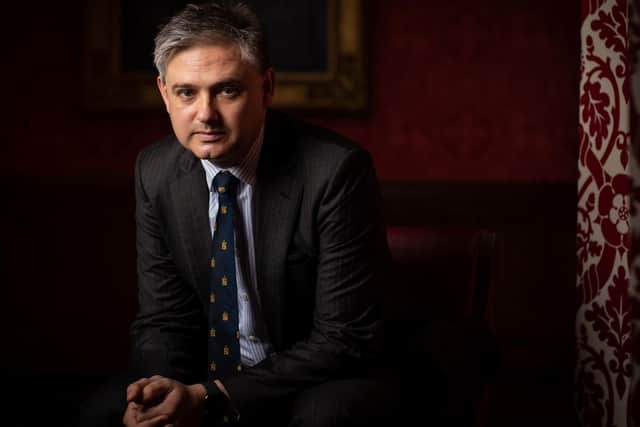Yorkshire-born ex-Labour MP Lord Walney wants to know why many politicians won't criticise 'unacceptable' Extinction Rebellion tactics
It was a period when the likes of Labour heavyweights David Blunkett and Clive Betts were still serving on Sheffield City Council before heading down to Westminster, and he describes early memories of walking the former Home Secretary's guide dog "when I was really little".
"I remember going on what was termed by Sheffield Labour group and the councillors as 'Labour camp', I didn't really appreciate the joke back then, we went camping in the Lake District, I have really great memories of that.
Advertisement
Hide AdAdvertisement
Hide Ad"I genuinely think I composed my own verse of (Labour party anthem) The Red Flag at about nine years old, excruciatingly embarrassing, and it related to the most recent Sheffield local elections."
Fast forward three decades and his career path may not have been the one the young Labour activist of the 1980s would have anticipated. A Labour MP for eight years, he fell out with the party's leadership under Jeremy Corbyn and left to stand as an independent, before endorsing the Conservatives at the 2019 General Election.
Ennobled as Baron Walney in Boris Johnson's Dissolution Honours list in 2020, he now advises the Conservative government on political violence and disruption and sits as a non-aligned peer in the House of Lords.
Given his fundamental disagreements with Mr Corbyn, who he described as being "a clear risk to UK national security", it's no surprise to hear he was "delighted and surprised" at the more centrist Sir Keir Starmer being chosen as his successor.


Advertisement
Hide AdAdvertisement
Hide AdAfter having the whip withdrawn in 2018 over allegations of sending text messages to a colleague, claims that he denied, he attacked what he described as a politically motivated investigation and left the party to serve as an independent.
"My assessment of the way the Labour Party is going to go has been almost universally wrong over the last 10 years and here I am out of it," he tells The Yorkshire Post from his office in Parliament.
"But part of my reckoning on leaving the Labour Party was that it was irreconcilably broken, and part of that was whichever candidate was given or claimed the Corbynite mantle standing after Jeremy Corbyn would win.
"And that proved not to be true. Sir Keir boxed clever, to say the least in navigating that road but you could credit that down to his skill as a politician and the kind of skills which he was going to need in the job."
Advertisement
Hide AdAdvertisement
Hide AdThough he suspects the public will cut the new Labour leader some slack given the unprecedented circumstances of the pandemic, he says Sir Keir still has a lot of work to do to break into the public consciousness ahead of the 2024 election.
With concerns mounting as to whether Sir Keir has what it takes to win a majority, Lord Walney believes his advisors now have to take a view about what kind of movement they want to lead.
One option is "a movement which embraces a large amount of Corbynism bar what they view as a relatively small edge of unacceptability but present that as a broad coalition".
But the alternative is trying to achieve a coalition "which takes in a lot of the people who would have been loyal to Jeremy Corbyn, because he was a leader and some of the people would have been inspired by some of the things that he said, but that much more explicitly rejects Corbynism".
Advertisement
Hide AdAdvertisement
Hide Ad"You would expect me to say this but I think [the latter] is the route to actually being able to govern Britain properly and having a better chance of electoral success and having a better chance of bringing back many of the communities who voted Conservative for the first time in a very long time at the last election."
Originally a journalist by trade at The Scotsman after being educated at Tapton School in Sheffield and the University of Edinburgh, he later re-entered the political world and worked his way up to being Special Adviser to Prime Minister Gordon Brown at the height of the global recession.
A member of the Defence Select Committee and the Home Affairs Select Committee during his nine years as an MP for Barrow and Furness in Cumbria, he was appointed in 2019 as the UK's special envoy for countering violent extremism.
But by the time he got going in the role, the challenges posed by the pandemic and the difficulty in going abroad to talk to international leaders about the Islamist terror threat meant he was forced to change direction.
Advertisement
Hide AdAdvertisement
Hide AdHis unpaid role, which he hopes will produce a report for the Prime Minister this Spring, now sees him looking at political violence and disruption.
"I'm particularly looking at that level of illegal organised activity which is often way below the counter terror element and for many reasons you wouldn't want to define it as terrorism," he says, "and yet is is deeply unacceptable to the vast majority of the public who want to get around their daily life and in some instances is absolutely designed to subvert democratic processes sometimes by other means."
As an example he cites the climate change protests led by Extinction Rebellion (XR), who have had hundreds of activists arrested and at various points blocked routes into major cities as well as targeting the printing presses of a number of major newspapers to stop their distribution.
He describes XR as "people who say they're acting overall in the name of a cause that the vast majority of people believe needs to be tackled like climate change, but bringing wholly unacceptable tactics and strategy to try to achieve those goals which stand to actually profoundly alienate large parts of the population, who certainly on something like climate change you have to take with you to be able to achieve those goals".
Advertisement
Hide AdAdvertisement
Hide Ad"One of the things which I'm interested in is why is this happening and to what extent is it actually the case that embedded within some of these noble causes are people whose actual overriding desire is just to bring down society and disrupt to the greatest extent possible the society we live in and stop people being able to go about their daily lives.
"And whether or not actually they believe they particularly believe in the goals of the cause to which they're attached like climate change or whether this is just a convenient vehicle.
"That's a fascinating and important angle to go into and I think too often politicians like myself have maybe consciously or subconsciously shied away from looking at these issues.
"That's one of the things I'm interested in looking at, why? Is it because we actually believe in the overall cause and therefore we subconsciously assign noble motives to unacceptable behaviour or alternatively if you criticise the tactics of a particular movement, can you be labelled as actually against the overall aim and so people shy away from that? I think it's an important area to look at."
Advertisement
Hide AdAdvertisement
Hide AdDescribing the difficulties thrown up by the pandemic, he talks about the "added challenge of people who are spending much more of that time online without the human contact which can really help to keep people grounded and in a sensible place".
"We're all living through incredibly tough circumstances and in those environments disinformation and malicious narratives can really thrive so it's huge credit to what many of our agencies are doing and what different parts of a lot of community groups are doing to be able to put forward positive messages on things for example like the vaccine.
"You've seen a lot of work being done on trying to make sure that people have got the information that they need to be able to make an informed choice for their health and for the health of the community."
